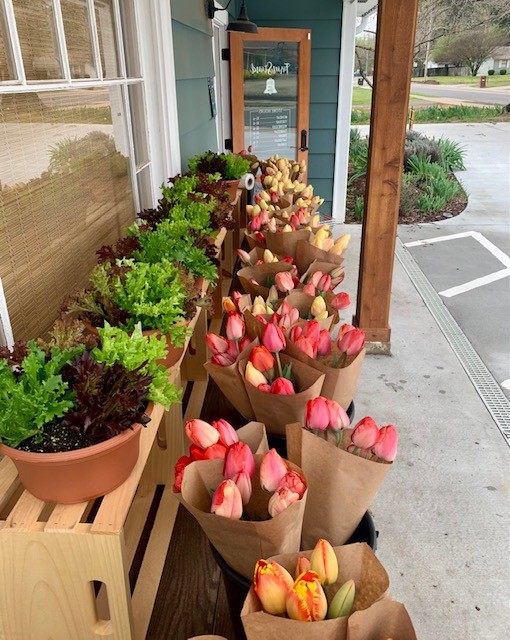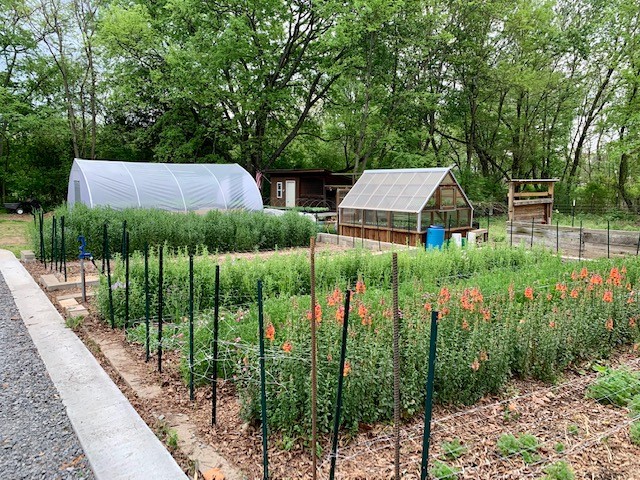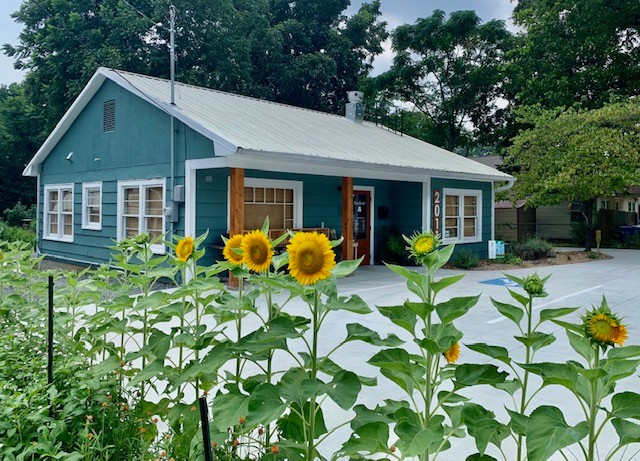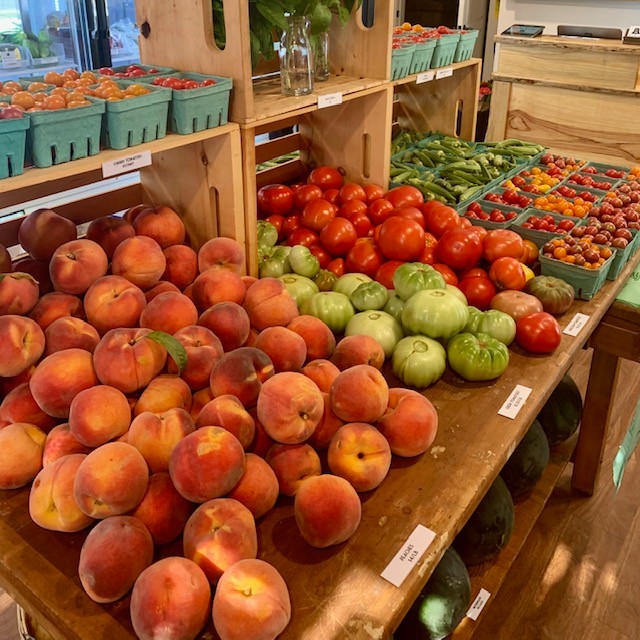We were lucky to catch up with Kim Doughty-McCannon recently and have shared our conversation below.
Kim, appreciate you joining us today. Let’s kick things off with your mission – what is it and what’s the story behind why it’s your mission?
Our mission behind opening The Farmstand, our on-farm local foods grocery store, was to make locally grown food more assessable to our community while also providing other small farmers in our area a year-round market to sell their goods. We had been growing and selling produce and flowers at our local farmers market for several years but saw that there was a need for more local food options in our city. Our local farmers market was only open one or two days per week and only half of the year. We live in central Arkansas which has a long growing season and mild winters, why shouldn’t one be able to grow and sell produce year round? In a state where big Ag is king, we wanted to show some love for the little guys, the small-scale sustainable farmers that grow produce and raise animals that are often more healthy and better for the environment.


Kim, before we move on to more of these sorts of questions, can you take some time to bring our readers up to speed on you and what you do?
My name is Kim Doughty-McCannon and I own Bell Urban Farm and the Farmstand with my husband Zack McCannon. We have two little boys, Win and Leo, age 5 and 3. We run our business with the help of a team of 5 employees and countless friends, volunteers and family members.
Zack and I started Bell Urban Farm in 2017. I had been struggling with working the typical 9 to 5 in an office setting and knew I wanted to spend my years doing something I was more passionate about. This constant nagging feeling lead me to leave my laboratory job in public health to explore volunteering and working at several local farms. I struck gold when I landed an apprenticeship position at Little Rock Urban Farming. There I learned how to grow flowers and veggies intensively on a small scale, how to market and sell produce and work with the community. From there I moved on to Conway, AR (where I now live) to serve with an Arkansas based Americorps program called Arkansas GardenCorps. During my time with GardenCorps, I managed an educational community garden at a local library and created garden and nutrition based programming for kids and adults. After my AmeriCorps term was over I felt confident in the knowledge and skills gained to be able to start our own farm, Bell Urban Farm. We started out as a mixed veggie and flower farm, selling online, at a local farmers market and a little wholesale to local restaurants. Over the years, we have discovered that our niche is cut flowers so now our whole farm (about 1.5 acres) is dedicated to cut flowers that we harvest weekly and turn into beautiful mixed flower bouquets that we sell at our farmstand. We also grow thousands of vegetable, herb and flower plants in the springtime as part of our annual plant sale.
The idea for The Farmstand came about from our days of selling at the farmers market. I could see the potential and the need for so much more local food in our city. How could we grow a network of other local farmers and artisans from central Arkansas and all across our state and aggregate their goods into one location where our community had access to it 7 days a week, just like your typical grocery store? That was the original idea and the need to make it happen only grew stronger during my pregnancies with our two kids. Setting up at the farmers market at dawn in the summer heat was getting harder and harder for me to manage. We then shifted to a honor system model set up at our farm. Once or twice per week we would set up our open air market and take payments in a cash box or by digital apps. We even started working with other local farmers to supply goods to our little on farm market. This honor system model became extremely important for us during covid. We were still able to set up every weekend and folks enjoyed being able to stop by and get what they needed with limited interaction with others. We all saw how our global supply chains started to break down during the pandemic and we were leaning on local producers even more. This really cemented the idea of The Farmstand for us and we were actually already in the process of re-zoning our property and fundraising to renovate an old farmhouse to turn it into our brick and mortar local foods grocery store. After much community support from our neighbors, family, friends, customers and the city, we were able to get our project fully funded on Kickstarter (we raised over $155,000) Every penny of this was spent to turn a 1940’s farmhouse into our Farmstand grocery store). We opened our doors in November 2020 during COVID and here we are today! We work with over 100 other local farmers and artisans to help stock our shelves each week! We serve hundreds of community members each week that come to the farm to shop or attend one of our workshops or events. So much has happened over the past few years and not a single one would have been possible without the amazing support of our community. I see our business as one part farm, one part grocery store/retail business, and one part community center (with on farm workshops and educational content). I feel proud that we can offer a place for people to purchase healthy, locally grown food and I feel proud of all of the other small farmers that we work with. Small-scale sustainable agriculture is the way of the future!
Can you open up about how you funded your business?
We would not be where we are today without crowdsource funding! As I mentioned before, we used Kickstarter to help raise funds to renovate an old, falling apart 1940’s farmhouse on our property to turn it into our Farmstand. The inside of this old house was rough…the whole thing had to be gutted, new plumbing, new electrical, new kitchen, new everything. Plus we had to adhere to local health department and fire department regulations for commercial kitchens and grocery stores. We had to re-zone our whole property in order to even have a grocery store on site which was another added expense. At the time, our business was so new and so small, no bank was going to give us a loan to cover the costs of this project. Enter, crowdsource fundraising. We chose to use Kickstarter as our funding platform and we had about 30 days to raise the money needed. It was all or nothing. $150,000 or ziltch. It took us about 6 months to prepare for the launch of our campaign. I interviewed local people that had run successful kickstarters, we had countless community meetings with our neighborhood, meetings with the city planner, city council meetings, etc. I went on local radio shows and local news channels to talk about our project…basically anything and everything we could do to share our story and our vision with anyone who would listen! We submitted our application to kickstarter, made a video and shared our dream with the world. For a month our eyes were glued to the computer screen as we inched our way upwards towards our goal. I think we reached our goal within 48 hours of our campaign expiring. It was the hardest thing I have ever done, putting my self out there and constantly asking people for money again and again. We wouldn’t be where we are today without the tremendous support of friends, family, community members and complete strangers who donated to us. I think about this almost daily and am filled with gratitude!


If you have multiple revenue streams in your business, would you mind opening up about what those streams are and how they fit together?
I think for small businesses to survive in today’s economic climate you need to have as many supplimentary revenue streams as possible, COVID taught us this but it has always been important.
Our business started off as just a farm. We sold flowers and produce direct to consumer at the Farmers’ Market and online. We started offering custom orders, pop up markets and then eventually opened the Farmstand grocery store where we partner with other small farmers to offer a widely expanded selection of goods. We started selling our flowers wholesale as well, we opened our online website where people could order our products online and have them shipped nationwide, we offer educational workshops at our farm, we offer Farm Box Subscriptions (CSAs) for veggies, flowers, bread and more. We have several other ideas in the works, more specialty produce offerings, like mushrooms, expanded educational content, farm stays at an AirBNB and more.
Of course, as our business has grown, we now have employees and payroll to worry about, so it is more important than ever to have multiple revenue streams to keep our business afloat!
Contact Info:
- Website: bellurbanfarm.com
- Instagram: https://www.instagram.com/bellurbanfarm/
- Facebook: https://www.facebook.com/BellUrbanFarm
Image Credits
All photos are taken by me, Kim Doughty-McCannon except the one of myself, which was taken by Meredith Spray.


